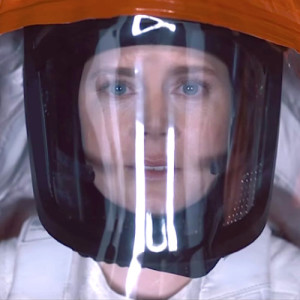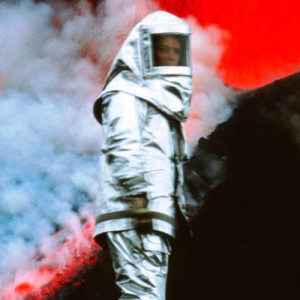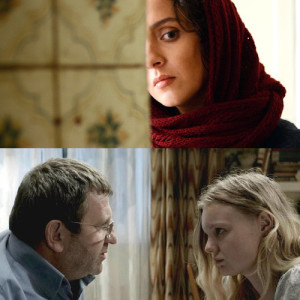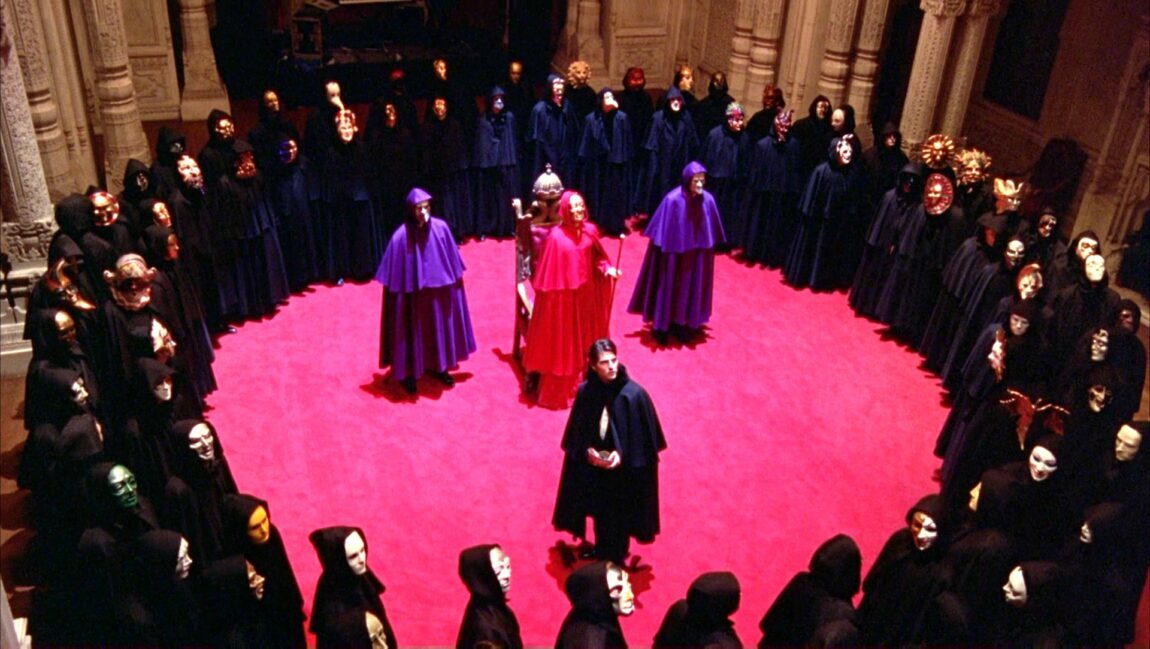The 41st Toronto International Film Festival recently wrapped, and our writers were on hand to soak up the cinema bounty. Our first of two dispatches includes hotly anticipated fall releases like Denis Villeneuve’s mysterious sci-fi film Arrival and Barry Jenkins’s decades-spanning character study Moonlight; holdovers from the competition lineup of this year’s Cannes Film Festival, including Asghar Farhadi’s The Salesman, Christian Mungiu’s Graduation, and Jim Jarmusch’s Paterson; and a smattering of films looking to translate TIFF 2016 buzz to a wider audience, like actress Alice Lowe’s directorial debut Prevenge and Iranian Ana Lily Amirpour’s second feature, The Bad Batch. Some of these are, as is to be expected, much more worth your time than others. We’re here to help.


An auteurist invention of the highest order, Matías Piñeiro’s ongoing “Shakespeare series” is the ideal platform to showcase the Argentinean director’s enticing and increasingly unique style. His previous features (Rosalinda, Viola, and The Princess of France—inspired by As You Like It, Twelfth Night, and Love’s Labour’s Lost, respectively) express a particular sensibility, rather than an overarching methodology, in deconstructing the Bard. Like Shakespeare, Piñeiro luxuriates in language and character interplay, but he also has the instincts of Jacques Rivette. Hermia and Helena, modeled on Shakespeare’s A Midsummer Night’s Dream, is a crisscross of time, space and location. Here, the director’s mesmeric use of dissolves and superimpositions cement the work as a shrewdly filmic entity, proving this increasingly fruitful series is focused on giving an expressive and sensual shape to the very process of adapting and experiencing Shakespeare’s plays. The film stars Piñeiro mainstay Agustina Muñoz, who plays an Argentine artist embarking on a residency in New York City, where she’ll complete the translation of A Midsummer Night’s Dream that she plans on staging back home. Her friend (Maria Villar) has just finished the same program, and she proves a suitable and somewhat knowing replacement for the attentions of the other fellows. Leaping between past and present, English and Spanish, Brooklyn and Buenos Aires, Piñeiro weaves an overlapping story of love and loss that diverts from the source material without ever fully abandoning it. Meandering as it is, Hermia and Helena has a deliberate pace unusual to Piñeiro, gradually working toward a climactic scene between the protagonist and an enigmatic figure from her past (played by indie filmmaker Dan Sallitt). This is easily Piñeiro’s most somber film to date, and though the broadening of his emotional landscape, as well as the sharpening of his narrative strategy, seems out of character, both represent a major step forward and signify even greater things to come. Drew Hunt
A director of compassionate, deeply human portraiture, typically of decent people navigating the currents of their respective worlds, director Kelly Reichardt manages to ratchet up the raw emotion—and without betraying the placidity of her particular aesthetic—in Certain Women, a film that moves through three barely-connected narratives and never surrenders to the verbosity or manipulative tics of similar mosaic works. Delicate and judgment-free, Reichardt’s latest thematically tethers its disparate parts to a powerfully affecting whole. Concerning itself with the pain we passively inflict on others, born most often from the privilege that power, money, and stability affords, Reichardt charts the connections and consequences of paths crossed and shared by the meek and the assured. Coaxing performances of great strength, and crafting stunning compositions without any semblance of ostentatiousness, the director’s dedicated naturalism allows her audience the freedom to feel as freely and deeply as she does about her characters and their lives. And while the film’s trio of codas feels extraneous and the strength of the film’s final third may slightly diminish the power of its precedent segments, the cumulative vision is one of supreme technical craft and boundless heart. Luke Gorham
Mia Hansen-Løve’s Things to Come—that other film at TIFF ’16 in which Isabelle Huppert acts alongside a cat—tracks several years in the life of philosophy teacher Nathalie Chazeaux (Huppert) and her divorce from a cheating husband, crafting a self-consciously intelligent look at life’s various adjustments. Unfortunately, this is a movie rife with unrealized emotional potential, to the point that it doesn’t even feel like Nathalie is experiencing real turmoil. Everyone remains straight-faced and the drama doesn’t gain momentum beyond the initial setup. A scene in which Nathalie’s daughter makes her father confess to adultery exemplifies this well: both remain so calm and forthright about the dilemma that it comes off more like a business transaction than a revelatory moment. True, the point could be that our lives rarely are actually altered that much, even when something like this happens, but the movie is so inert that we lose sight of the message, or simply don’t care. The divorce never threatens any part of Nathalie’s life, and neither does it stir our interest. There are moments that aim for a heavier emotional register—for instance when Nathalie seemingly is stalked or sees her former husband with his mistress. But these are minor blips in an otherwise far too sangfroid movie, one that fails to stir feelings despite its harrowing content. Paul Attard
Jim Jarmusch’s career trajectory has afforded distinct perspectives on his work, especially as that relates to the idea of a monotonous kind of living. Paterson is generally no different in this regard, but it hints at a possible introduction of optimism. The film’s titular protagonist (Adam Driver) lives with his partner Laura (Golshifteh Farahani) in Paterson, NJ. Paterson drives a bus for a living; he also writes poetry, inspired by what he sees during his daily life—as did William Carlos Williams, a former resident of Paterson, whose poetry inspires our modern-day everyman. Paterson (the man) has a daily routine, and the viewer soon becomes familiar with it. In the span of one week, Paterson does little to deviate from this path even as various oddball characters and circumstances threaten to intervene. There’s a lyrical flow and a beauty to this—his life always winds back around to the same place despite outside intrusions. Much like the poetry Paterson writes, there’s a rhythmic quality to how the film operates—not through plot, but more by whatever life throws at our main character. Like the best from Jarmusch, this one works because of that seeming aimlessness, and the sense of a cosmic balance between positive and negative moments. In Paterson’s small successes, we find a happiness, a reprieve from bleak realities of our own lives. If monotony is inescapable, then Jarmusch seems to have found the best way to cope with that. PA
Delivering as both a remarkable exercise in sensuousness and a wholly affecting look at suffocated identity, Barry Jenkins’s second film is one of remarkable intimacy, lyrical in both text and texture. A triptych framework explores the life of Chiron (played alternately by Alex Hibbert, Ashton Sanders, and Trevante Rhodes) at three defining periods of his life (connected by a handful of narrative threads), patiently and organically addressing issues of masculinity, sexuality, and identity without the feeling that these themes du jour are being force-fed. In execution, Moonlight is a masterpiece of feeling, built up in the tension between silence and noise, committed to watching its characters process their own existence, and preferring to use what’s left unsaid as a mechanism for developing meaning. Complimenting this is a score comprised of both symphonic compositions and chopped and screwed hip-hop tracks, an obvious but still effective parallel of the dichotomy between Chiron’s inner nature and outer existence. Visually, Jenkins doubles down on the film’s sensuality, reveling in the sweat-glistening black bodies of his actors and intimately framing shots to capture the close-quartered glances and gestures that occur between conversations. Boasting an overwhelmingly powerful final third layered with past tragedies and future possibilities, Moonlight is transcendent even of its considerable parts, its sum a portrait of aching humanism. LG
Alice Lowe‘s character in Ben Wheatley’s Sightseers was named Tina; in her own directorial debut, Prevenge, she plays Ruth. Really, though, the different names don’t matter: both characters are extensions of each other in the ways they actualize their misanthropic worldview through bloody murder. But while Wheatley fully embodied his central couples’ hatred of humanity, Lowe keeps a critical distance from her own creation. Though the basic underlying premise is that the baby growing inside of Ruth is controlling its mother, leading her to commit violent acts of murder, there are hints early on that things may not be so simple—that those murderous mumblings she hears from her pregnant belly may well be figments of her own prepartum-depressed imagination. It’s a warped perspective hardly helped by the fact that she’s still dealing with the death of her husband as the result of a rock-climbing tragedy that may not have been an accident—a belief that fuels the revenge implied by the film’s title. What initially seems like a one-joke movie in its first two-thirds eventually reveals deeper psychological layers in its final act, especially as we begin to get a fuller picture of the tragedy that inspires Ruth’s killing spree. It all leads to a final punchline that actively denies the redemption arc Lowe seemed to be building toward, suggesting a character who’s gained a fuller awareness of her own disturbed self. KF
In her promising first feature, A Girl Walks Home Alone at Night, Iranian director Ana Lily Amirpour forewent the feminist messaging her film’s title might have suggested and instead surprised with a stylish meet-cute premise involving a vampire. Her follow-up, The Bad Batch, substitutes vampires for cannibals and the debut’s ghost town setting for a barren wasteland. The vision is far grander than her reach, though, and the film is ultimately undone by an inability to moor its ideas into anything resembling cohesion. There is a sense of room to play here, and the possibilities are considerable—the cultish oasis community seems ready-made for premium cable serialization—but Amirpour fails to deliver a navigable world or characters worth exploring. Instead, we are given leads defined almost exclusively by superficial identifiers: Suki Waterhouse’s character almost immediately loses two of her limbs, just to emphasize her grittiness, while Jason Momoa chokes on a Cubano accent utilized only for cursory commentary on the continued criminalization of illegal immigration in this future world. The film never manages to develop itself beyond a surface appeal, and it ultimately works as little more than an amalgam of fanboy curiosa. LG
Though Romanian director Cristi Puiu sets his latest film, Sieranevada, at a family gathering commemorating the death of a late patriarch, the filmmaker has much more on his mind than simple grief. Taking place soon after the attack at the Charlie Hebdo offices and bringing together communists, conservatives, adulterers and a 9/11 truther, this film is an ideological battleground where, rather than hash out bare interpersonal issues, family members mask their disagreements with pious beliefs. The closest thing to a protagonist is Lary, the eldest brother of the middle generation, who treats the disagreements of his family with an almost lackadaisical indifference. To him, the bickering is to be expected and he approaches the proceedings with the air of a man long since exhausted beyond sincere care—at least until he comes to confront his own demons halfway through the film’s third hour. It’s easy to laugh along with Larry without sacrificing empathy thanks to a terrific script which depicts familial dysfunction naturally and without contrivance better than nearly any other film in recent memory. The playful tedium of Puiu’s script is assisted by the odd, rigid formalism of his direction. Most of the scenes in Sieranevada are filmed in one take, and each shot is roughly the same: a camera, locked in one location, pans and tilts across the action, pausing on meticulously organized, if often cluttered, frames. If nothing else, the technique evokes the feeling of being trapped at a family reunion, surrounded by people who will never get along. Chris Mello
“Everything disgusts me,” exclaims dying King Louis XIV (Jean-Pierre Léaud). The most disgusting thing present? The repulsive nature of aristocracy, laid out in full view in Albert Serra’s aptly titled The Death of Louis XIV. After a hunting trip, the Sun King feels a sharp pain in his leg. What follows is the ironically slow death of one of history’s most powerful men. Doctors recommend that he drink donkey’s milk to cure his gangrene, while they rub his leg with ash in the hope that their king recovers. Humor arises from the vast stupidity of everyone surrounding Louis, and their indifference to how ineffective their actions are. (“Gentlemen, we’ll do better next time.”) This plays into Serra’s worldview of the lunacy of nobility and highlights how mortal and inconsequential Louis is as his aids try to pump wine into him. Most of this weight rests with Léaud; the camera never leaves Louis’s room, or even his face. Léaud’s subtle expressions make his character’s regression even more palpable and human, giving the true feel of a man ready to accept death. At one point, Léaud stares directly at the camera for about a minute, as if Louis XIV is telling the audience he knows what his fate will be—that it’s only the idiots around him who don’t know what’s happening. PA
Asghar Farhadi’s The Salesman and Cristian Mungiu’s Graduation navigate similar thematic territory—that of patriarchs finding their ethical boundaries pushed when their self-perceived altruistic defense of family becomes distorted— and demand empathetic viewing. Each film offers a study of imperfect people acting imperfectly, daring the audience to offer alternative courses to their respective behaviors. And yet, perhaps a bit unfairly, but no less tangibly, this particular attribute has become part and parcel of these these two modes of cinema. Farhadi’s increasingly recognizable approach and the Romanian New Wave both have an established template that increasingly seems to result in sturdy films rendered marginally less spectacular with each outing, and in both cases this is due in part to the problem of familiarity. Farhadi’s latest once again indulges the director’s particular penchant for fashioning moral quagmires, but this time it throws a curveball in playing its narrative much more straightforward. The Salesman‘s framework revolves around a production of Death of a Salesman (threads of memory and self-deception run through both the play and the film), and the bulk of its runtime remains a low-key affair, even bordering on the inconsequential, before exploding into a final 30 minutes of relentless, gutshot storytelling, a masterclass in narrative cinema. This isn’t a rebranding by Farhadi, but it is a welcome recalibration that pays dividends. The Salesman operates best according to its intimacy and specificity of character, but Mungiu’s Graduation demonstrates more breadth through its particular incisiveness, opening up not into questions of systemic and not personal morality, and specifically the potential for justice and culpability in modern Romania. Less important here are the details of narrative; instead, it’s the context in which that narrative exists: a doctor of sterling reputation headlongs into snowballing impropriety and illegality to ensure his daughter has the opportunity to escape the country in which he once placed hope. The continued intrinsic corruption of Mungiu’s native land may not prove any more surprising or revelatory than in past efforts, and there are fewer answers to be found here than in Farhadi’s film—but also, surprisingly, there’s a good deal more hope to be found amid the mire. LG

















